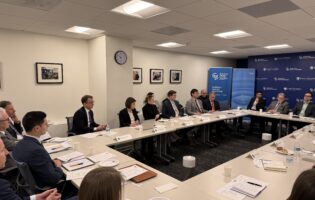DC Skills Initiative Working Group Meeting
How can the American vocational system learn from the German model to increase cooperation and economic prosperity between these two nations? That was the fundamental question that brought together the DC Skills Initiative Working Group at its first meeting on Tuesday, June 3, 2014. The group focused on setting a foundation of its purpose, as well as recognizing existing efforts to export this vocational system to supply the needs of growing corporate cooperation between Germany and the United States.
Mr. Robert Dehm from the German Embassy’s Economic Department led the presentation by first explaining the general tiered structure of the German educational system. He went on to give information on the close relationship between German companies and vocational training programs, explaining that unlike in America, in which labor qualifications are unstandardized, the standardized components of the German program allow employers to seek out exactly what they need in a potential hire.
The financing of the German vocational system is centered on the partnered corporations, encouraging firms to invest in their apprentices. Although the firms may take initial losses (because the firms pay the apprentices wages for their internship), the on-the job experience and eventual output of the apprentices maximizes later productivity gains and ultimately turns a profit for the company.
Currently, German corporations have begun to express interest to the German Embassy in establishing a similar system here in the United States. With an American “manufacturing renaissance” underway, German firms are looking into ways to adapt the German vocational systems to American economic needs. Not only could this initiative strengthen the transatlantic relationship, it could also provide lucrative business opportunities for German firms and create much needed jobs here in America. While questions of the philosophical and cultural differences in education and economics between the U.S. and Germany were identified as potential challenges to the project, later meetings of the group with different experts in the field will provide opportunities to discuss and solve difficult problems that may arise. The group meets on a monthly basis.







